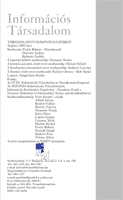A visegrádi országok perspektívája az Európai Kutatási és Innovációs Térségben
Chances of the so-called Visegrád countries in the European research and innovation area
Author(s): Balázs BorsiSubject(s): Economy
Published by: Gondolat Kiadó
Keywords: Visegrád (V-4) countries; competitiveness; ERA; innovation; R&D.
Summary/Abstract: This paper examines the chances of catching up for the countries of the Visegrád treaty (the V-4 countries: the Czech Republic, Poland, Hungary, and Slovakia), in connection with one of the chief strategic aims of the European Union, namely, the establishment of the European Research Area (ERA). The author arrives at the conclusion that the V-4 countries’ overall economic potential, and especially that in the field of R&D, is rather modest, in spite of the fact that in general political terms, these states belong to the more advanced countries of the world. He emphasizes that without comprehensive restructuring and improvement of the environment for a competitive market economy in the region, one cannot expect a real enhancement in the demand for innovation and R&D activities. An important assertation of the paper is coining the term „Visegrád paradox”: although, in international comparison, relative to the GERD, BERD, and GDP, the number of researchers is high, the innovative achievements of the V-4 countries are not commensurable with their scientific performance (the gap is greater than in the EU-15 countries). ntegration into the ERA is being hindered by the V-4 countries’ regional underdevelopedness (the low number of regional R&D centers-of-excellence). The EU’s considerable politicaleconomic pressures resulting from the desire of establishing ERA, effectuated by various support mechanisms, are highly inspirational for opinion-shaping leaders and decision-makers of the V-4 countries, however, the transformation of the national innovation systems essential for a healthy market economy will probably be a slow process.
Journal: Információs Társadalom
- Issue Year: 2006
- Issue No: 3
- Page Range: 54-70
- Page Count: 17
- Language: Hungarian

